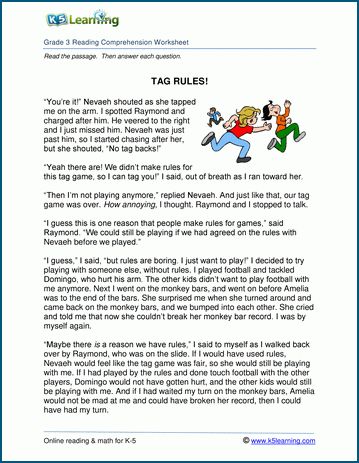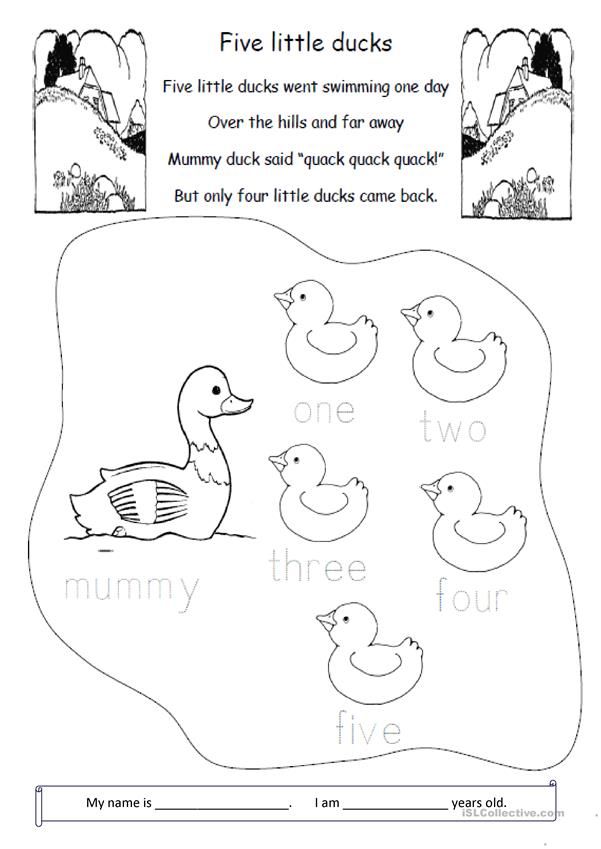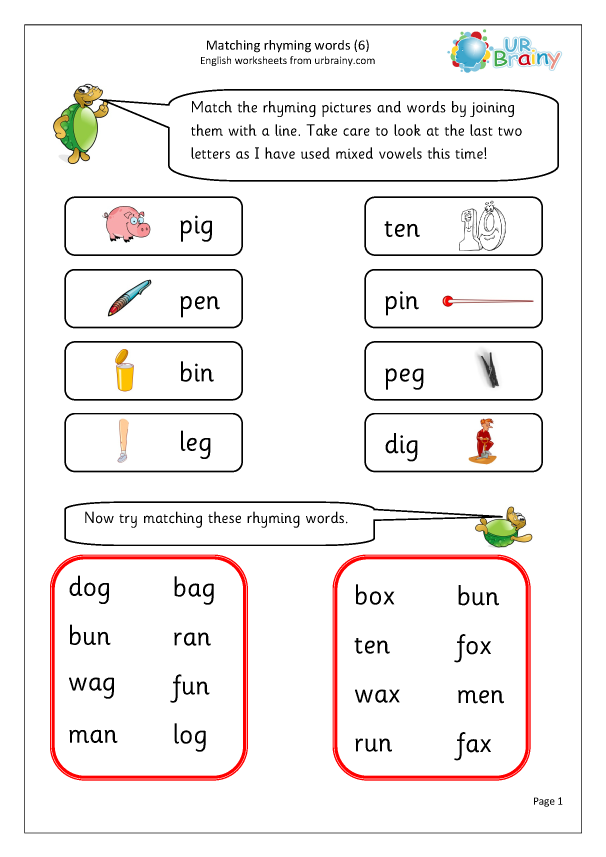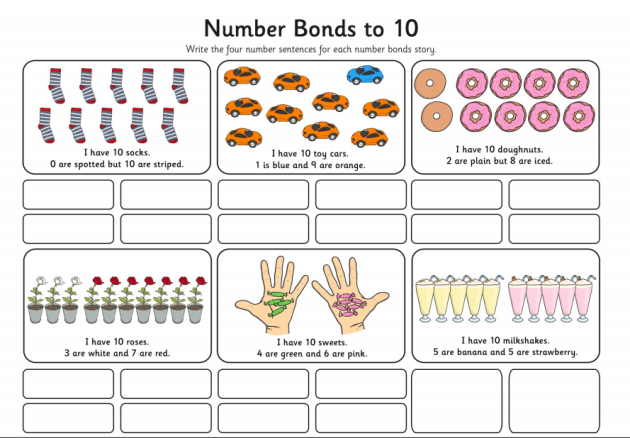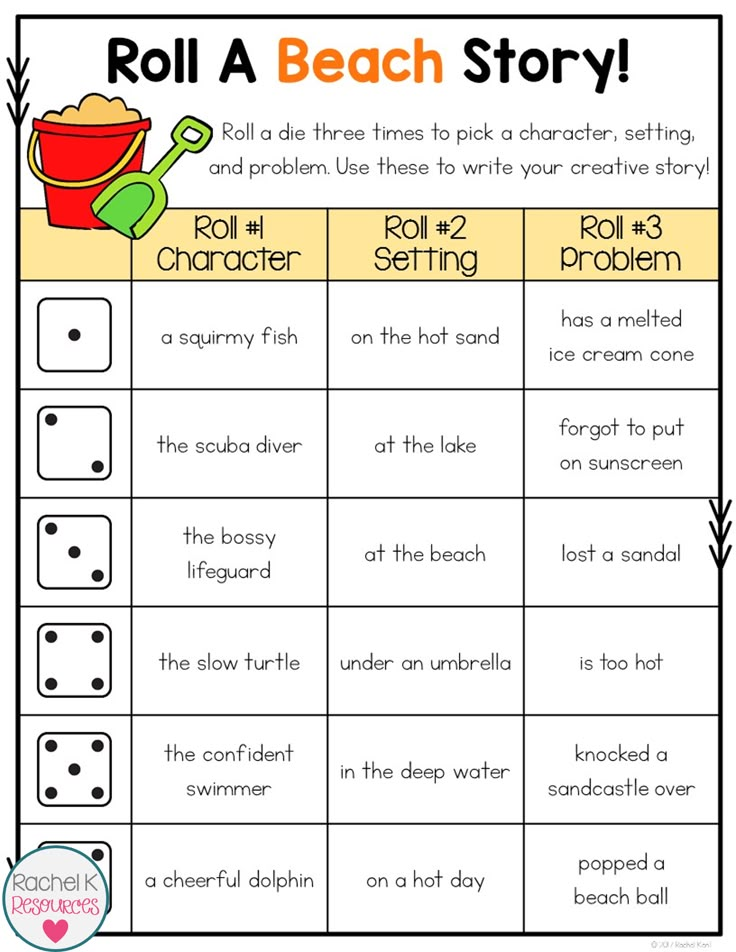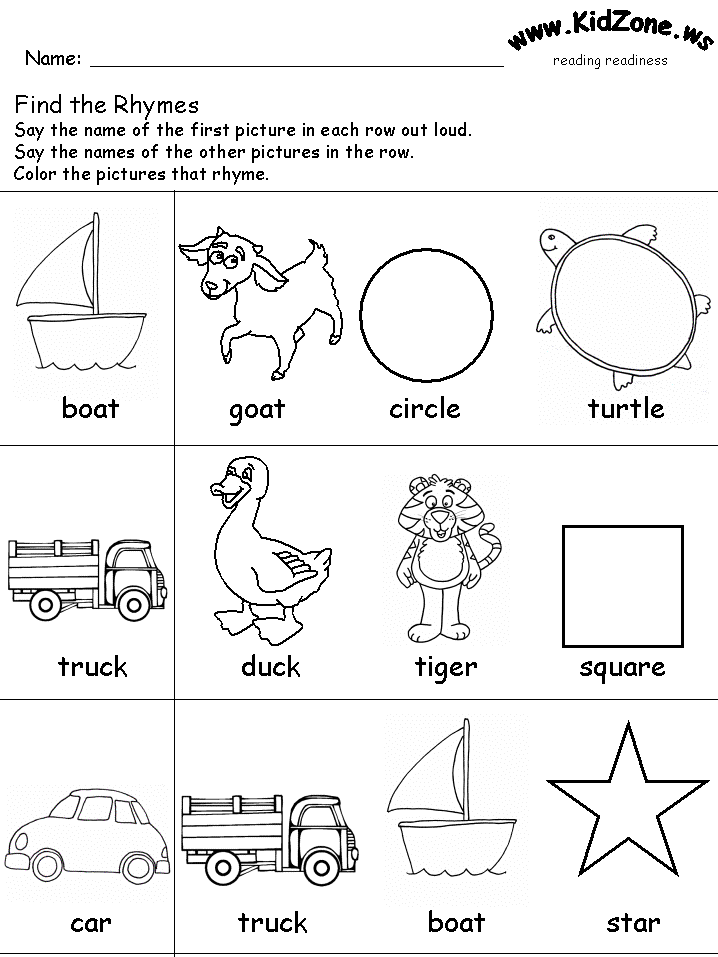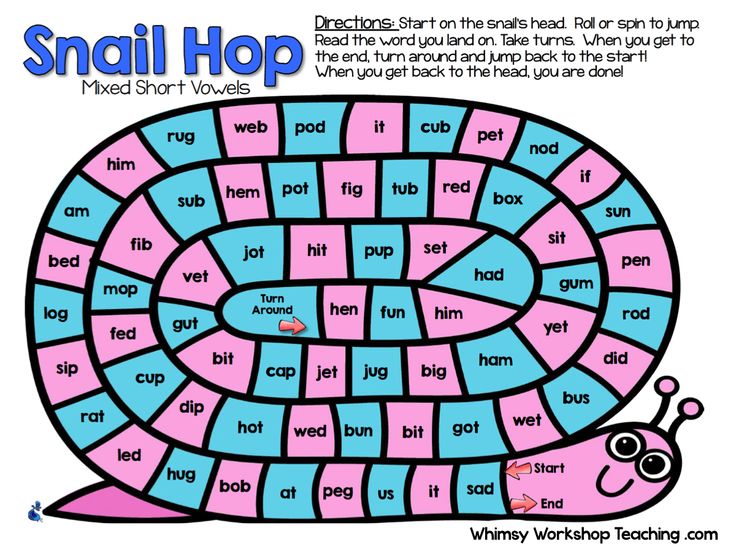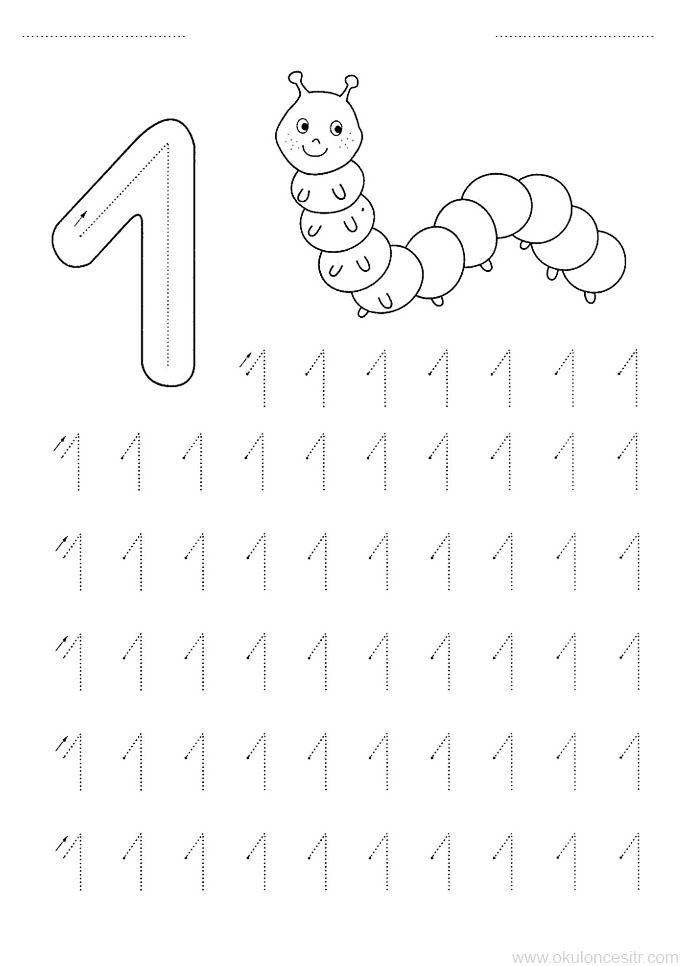Phonological awareness in reading
Why Phonological Awareness Is Important for Reading and Spelling
By: Louisa Moats, Carol Tolman
The phonological processor usually works unconsciously when we listen and speak. It is designed to extract the meaning of what is said, not to notice the speech sounds in the words. It is designed to do its job automatically in the service of efficient communication. But reading and spelling require a level of metalinguistic speech that is not natural or easily acquired.
On the other hand, phonological skill is not strongly related to intelligence. Some very intelligent people have limitations of linguistic awareness, especially at the phonological level. Take heart. If you find phonological tasks challenging, you are competent in many other ways!
This fact is well proven: Phonological awareness is critical for learning to read any alphabetic writing system (Ehri, 2004; Rath, 2001; Troia, 2004). Phonological awareness is even important for reading other kinds of writing systems, such as Chinese and Japanese. There are several well-established lines of argument for the importance of phonological skills to reading and spelling.
Phoneme awareness is necessary for learning and using the alphabetic code
English uses an alphabetic writing system in which the letters, singly and in combination, represent single speech sounds. People who can take apart words into sounds, recognize their identity, and put them together again have the foundation skill for using the alphabetic principle (Liberman, Shankweiler, & Liberman, 1989; Troia, 2004). Without phoneme awareness, students may be mystified by the print system and how it represents the spoken word.
Students who lack phoneme awareness may not even know what is meant by the term sound. They can usually hear well and may even name the alphabet letters, but they have little or no idea what letters represent. If asked to give the first sound in the word dog, they are likely to say "Woof-woof!" Students must be able to identify /d/ in the words dog, dish, and mad and separate the phoneme from others before they can understand what the letter d represents in those words.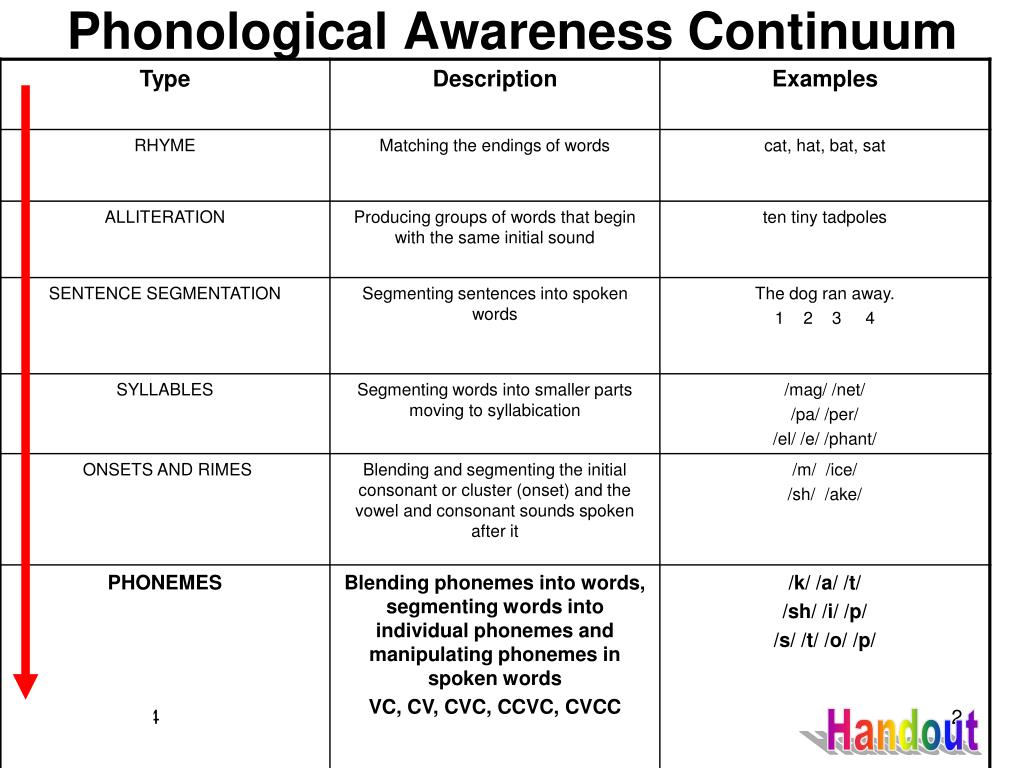
Phoneme awareness predicts later outcomes in reading and spelling
Phoneme awareness facilitates growth in printed word recognition. Even before a student learns to read, we can predict with a high level of accuracy whether that student will be a good reader or a poor reader by the end of third grade and beyond (Good, Simmons, and Kame'enui, 2001; Torgesen, 1998, 2004). Prediction is possible with simple tests that measure awareness of speech sounds in words, knowledge of letter names, knowledge of sound-symbol correspondence, and vocabulary.
The majority of poor readers have relative difficulty with phoneme awareness and other phonological skills
Research cited in Module 1 has repeatedly shown that poor readers as a group do relatively less well on phoneme awareness tasks than on other cognitive tasks. In addition, at least 80 percent of all poor readers are estimated to demonstrate a weakness in phonological awareness and/or phonological memory. Readers with phonological processing weaknesses also tend to be the poorest spellers (Cassar, Treiman, Moats, Pollo, & Kessler, 2005).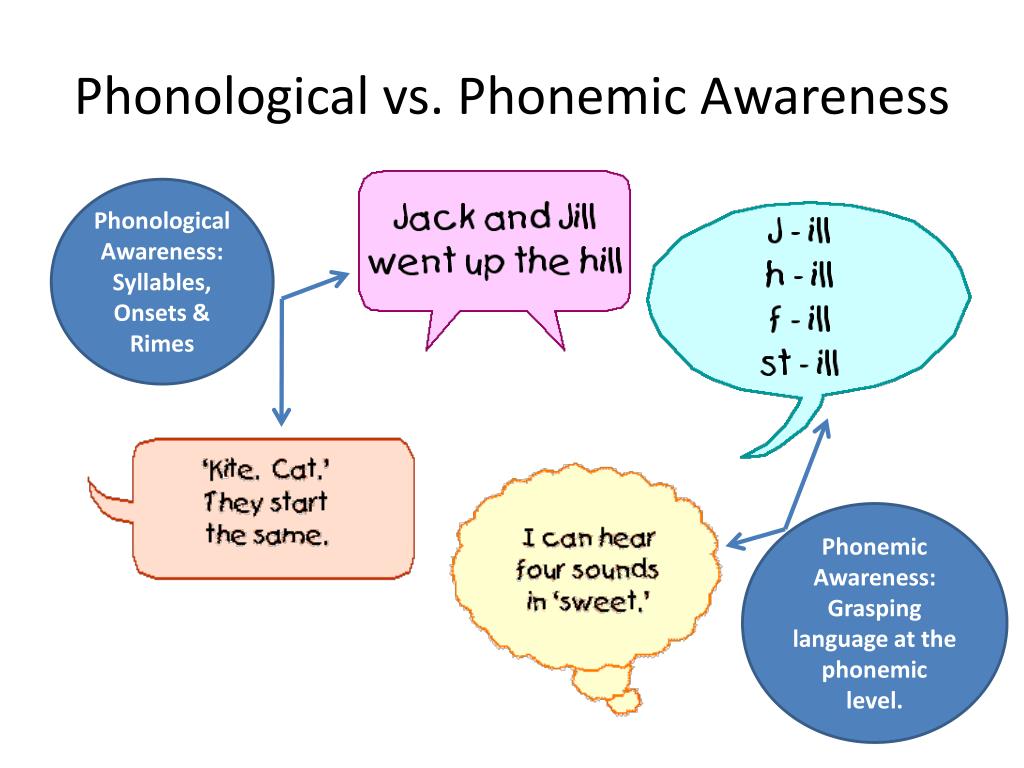
Instruction in phoneme awareness is beneficial for novice readers and spellers
Instruction in speech-sound awareness reduces and alleviates reading and spelling difficulties (Adams, Foorman, Lundberg, & Beeler, 1998; Gillon, 2004; NICHD, 2000; Rath, 2001). Teaching speech sounds explicitly and directly also accelerates learning of the alphabetic code. Therefore, classroom instruction for beginning readers should include phoneme awareness activities.
Phonological awareness interacts with and facilitates the development of vocabulary and word consciousness
This argument is made much less commonly than the first four points. Phonological awareness and memory are involved in these activities of word learning:
- Attending to unfamiliar words and comparing them with known words
- Repeating and pronouncing words correctly
- Remembering (encoding) words accurately so that they can be retrieved and used
- Differentiating words that sound similar so their meanings can be contrasted
Phonological and Phonemic Awareness | Reading Rockets
Phonological awareness is a broad skill that includes identifying and manipulating units of oral language – parts such as words, syllables, and onsets and rimes.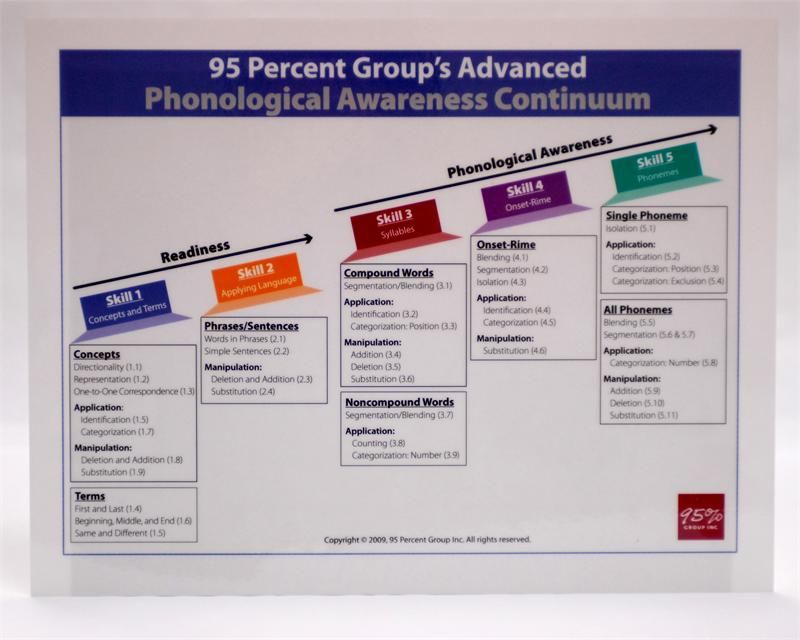 Children who have phonological awareness are able to identify and make oral rhymes, can clap out the number of syllables in a word, and can recognize words with the same initial sounds like 'money' and 'mother.'
Children who have phonological awareness are able to identify and make oral rhymes, can clap out the number of syllables in a word, and can recognize words with the same initial sounds like 'money' and 'mother.'
Phonemic awareness refers to the specific ability to focus on and manipulate individual sounds (phonemes) in spoken words. Phonemes are the smallest units comprising spoken language. Phonemes combine to form syllables and words. For example, the word 'mat' has three phonemes: /m/ /a/ /t/. There are 44 phonemes in the English language, including sounds represented by letter combinations such as /th/. Acquiring phonemic awareness is important because it is the foundation for spelling and word recognition skills. Phonemic awareness is one of the best predictors of how well children will learn to read during the first two years of school instruction.
Students at risk for reading difficulty often have lower levels of phonological awareness and phonemic awareness than do their classmates. The good news is that phonemic awareness and phonological awareness can be developed through a number of activities. Read below for more information.
The good news is that phonemic awareness and phonological awareness can be developed through a number of activities. Read below for more information.
What the problem looks like
A kid's perspective: What this feels like to me
Children will usually express their frustration and difficulties in a general way, with statements like "I hate reading!" or "This is stupid!". But if they could, this is how kids might describe how difficulties with phonological or phonemic awareness affect their reading:
- I don't know any words that rhyme with cat.
- What do you mean when you say, "What sounds are in the word brush?"
- I'm not sure how many syllables are in my name.
- I don't know what sounds are the same in bit and hit.
A parent's perspective: What I see at home
Here are some clues for parents that a child may have problems with phonological or phonemic awareness:
- She has difficulty thinking of rhyming words for a simple word like cat (such as rat or bat).
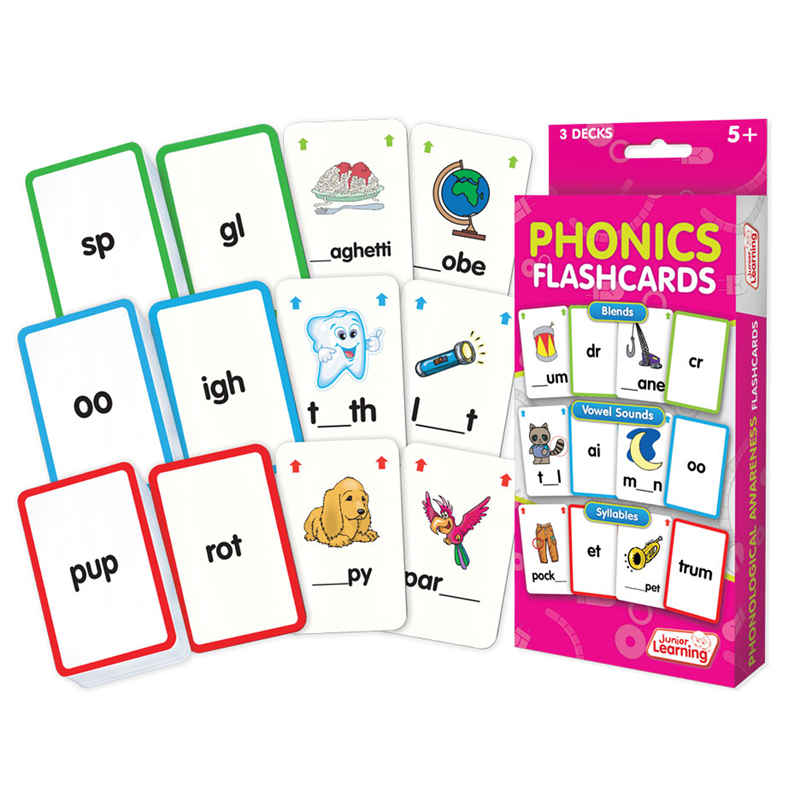
- She doesn't show interest in language play, word games, or rhyming.
A teacher's perspective: What I see in the classroom
Here are some clues for teachers that a student may have problems with phonological or phonemic awareness:
- She doesn't correctly complete blending activities; for example, put together sounds /k/ /i/ /ck/ to make the word kick.
- He doesn't correctly complete phoneme substitution activities; for example, change the /m/ in mate to /cr/ in order to make crate.
- He has a hard time telling how many syllables there are in the word paper.
- He has difficulty with rhyming, syllabication, or spelling a new word by its sound.
How to help
With the help of parents and teachers, kids can learn strategies to cope with phonological and/or phonemic awareness problems that affect his or her reading. Below are some tips and specific things to do.
What kids can do to help themselves
- Be willing to play word and sounds games with parents or teachers.

- Be patient with learning new information related to words and sounds. Giving the ears a workout is difficult!
- Practice hearing the individual sounds in words. It may help to use a plastic chip as a counter for each sound you hear in a word.
- Be willing to practice writing. This will give you a chance to match sounds with letters.
What parents can do to help at home
- Check with your child's teacher or principal to make sure the school's reading program teaches phonological, phonemic awareness, and phonics skills.
- If your child is past the ages at which phonemic awareness and phonological skills are taught class-wide (usually kindergarten to first or second grade), make sure he or she is receiving one-on-one or small group instruction in these skills.
- Do activities to help your child build sound skills (make sure they are short and fun; avoid allowing your child to get frustrated):
- Help your child think of a number of words that start with the /m/ or /ch/ sound, or other beginning sounds.

- Make up silly sentences with words that begin with the same sound, such as "Nobody was nice to Nancy's neighbor".
- Play simple rhyming or blending games with your child, such as taking turns coming up with words that rhyme (go – no) or blending simple words (/d/, /o/, /g/ = dog).
- Help your child think of a number of words that start with the /m/ or /ch/ sound, or other beginning sounds.
- Read books with rhymes. Teach your child rhymes, short poems, and songs.
- Practice the alphabet by pointing out letters wherever you see them and by reading alphabet books.
- Consider using computer software that focuses on developing phonological and phonemic awareness skills. Many of these programs use colorful graphics and animation that keep young children engaged and motivated.
What teachers can do to help at school
- Learn all about phonemes (there are more than 40 speech sounds that may not be obvious to fluent readers and speakers).
- Make sure the school's reading program and other materials include skill-building in phonemes, especially in kindergarten and first grade (these skills do not come naturally, but must be taught).
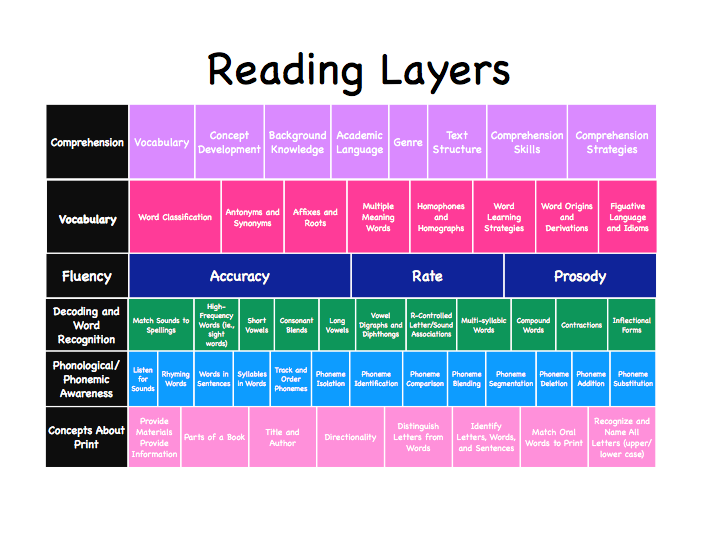
- If children are past the age at which phonemic awareness and phonological skill-building are addressed (typically kindergarten through first or second grade), attend to these skills one-on-one or in a small group. Ask your school's reading specialist for help finding a research-based supplemental or intervention program for students in need.
- Identify the precise phoneme awareness task on which you wish to focus and select developmentally appropriate activities for engaging children in the task. Activities should be fun and exciting – play with sounds, don't drill them.
- Make sure your school's reading program and other materials include systematic instruction in phonics.
- Consider teaching phonological and phonemic skills in small groups since students will likely be at different levels of expertise. Remember that some students may need more reinforcement or instruction if they are past the grades at which phonics is addressed by a reading program (first through third grade).
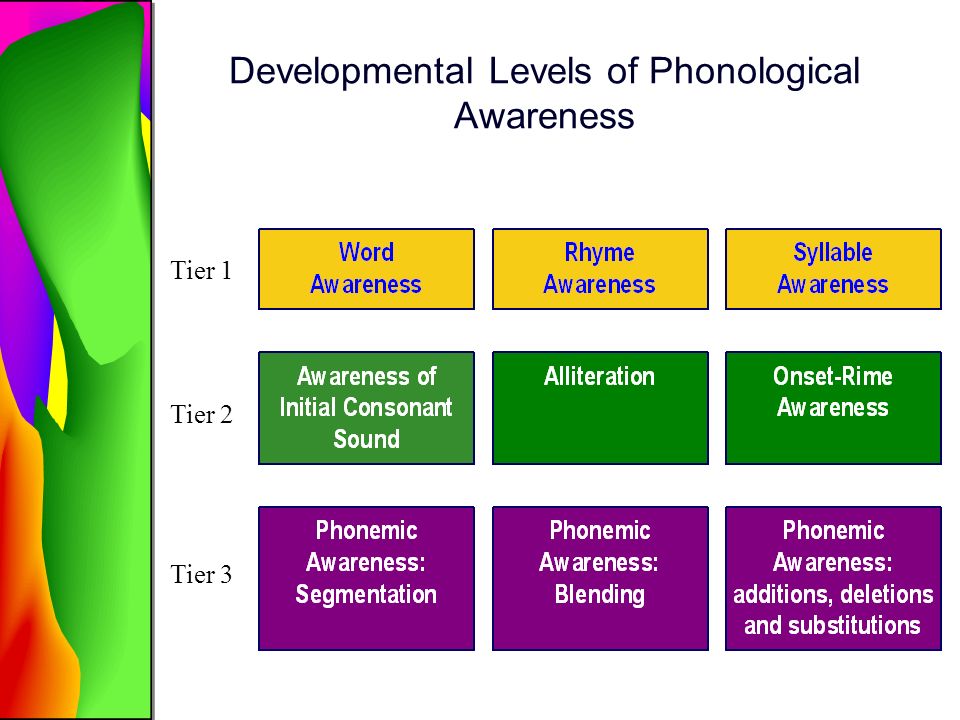
More information
Additional resources
See the Reading Issues section on Understood.
next page >
15 Learning Disorder Terms Parents Need to Know
If your child has a language, reading, or learning or attention disorder, you may have come across these terms on social media, on forums, or at professional appointments. .
Terms such as phonological awareness, auditory processing disorder, auditory accuracy, phonological memory…
Understanding these 15 terms will help you better organize the help you need for your child:
1. Phonetics
Phonetics - this term refers to the sound structure of the language: the relationship between a letter or a combination of letters (for example: chi, shu, cha, yes) and the speech sounds they represent.
Phonetics is the foundation of reading and writing skills.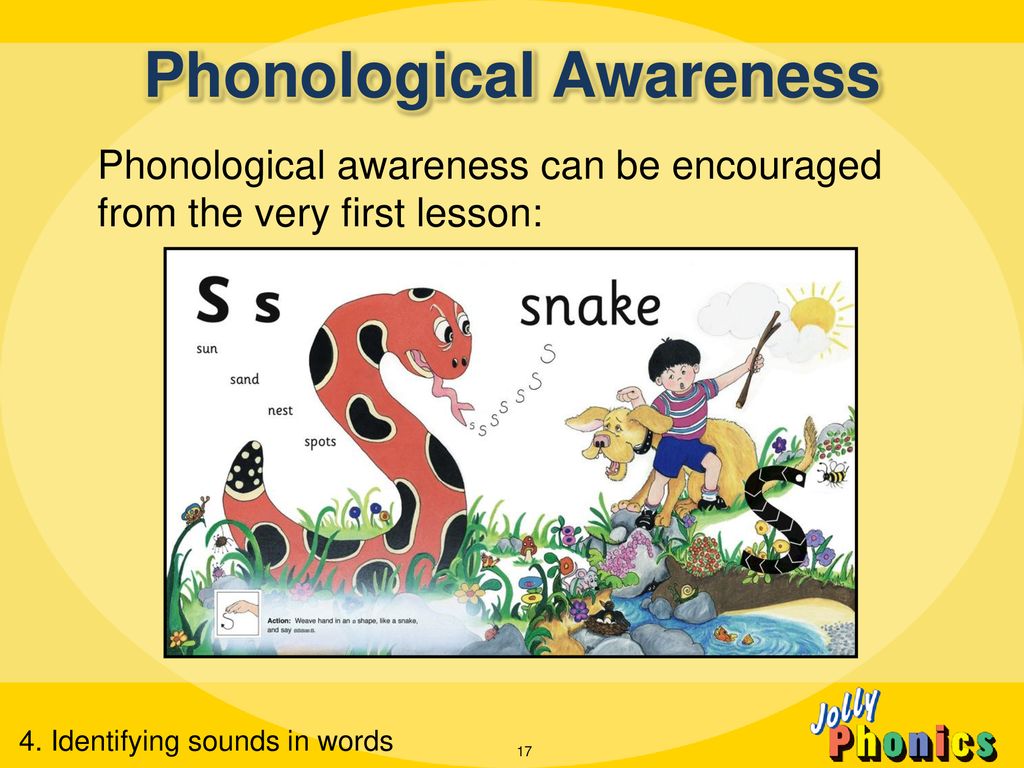 Thanks to phonetics, the child decodes written words in the process of reading.
Thanks to phonetics, the child decodes written words in the process of reading.
2. Phonemes
A phoneme is the sound of speech. When we speak Russian, we make 42 different speech sounds. But there are only 33 letters in the Russian alphabet. This is one of the reasons why Russian is difficult to learn.
3. Phonemic perception
Phonemic perception is the ability to perceive individual speech sounds (phonemes) in words and work with them.
Learn how to develop phonemic awareness from an early age.
4. Phonological awareness
Phonological awareness is the awareness that words are made up of smaller parts (such as syllables and sounds).
The term includes a range of sound-related skills that a student needs to develop reading skills. As the child develops phonological awareness, he/she not only comes to understand that words are made up of small sound units (phonemes), but also learns that words can be broken down into larger sound "chunks" known as syllables.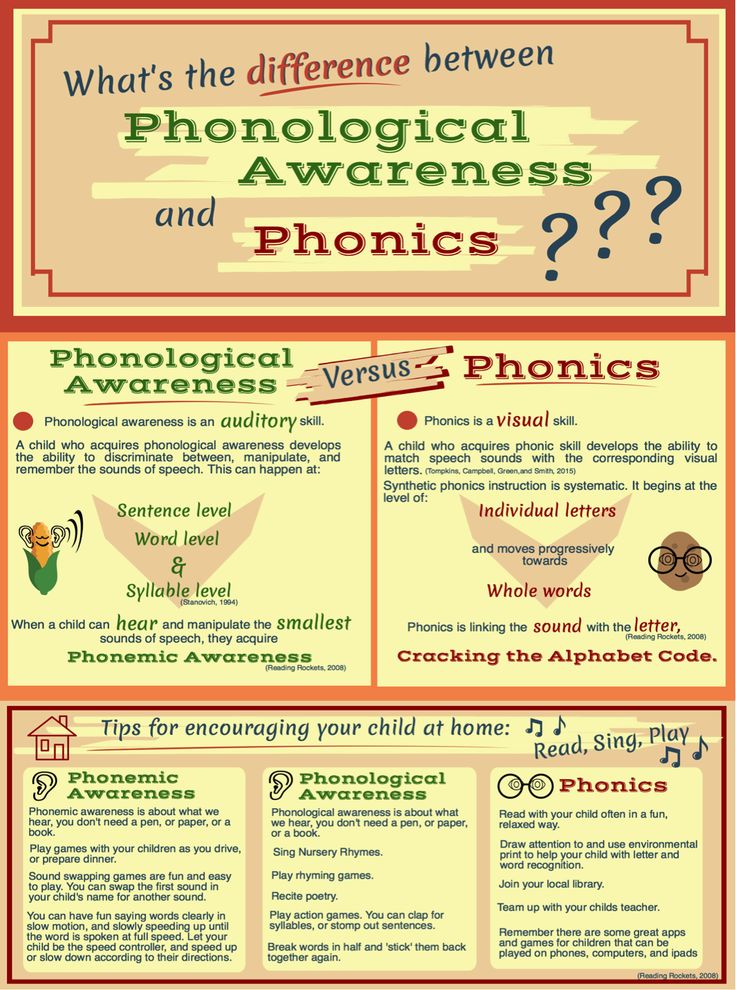 .
.
5. Phonological accuracy
Phonological accuracy refers to the ability to correctly distinguish between individual phonemes (e.g., in similar-sounding words that begin with the same sound) or other aspects of phonology (e.g., rhyming, number of syllables).
Phonological accuracy is key to listening and reading skills. This allows the student to make a clear distinction between similar-sounding words (e.g. "heron" and "saber" or "picture" and "basket"), including morphological differences that can drastically change the word's meaning and/or grammatical function (e.g. " known" and "unknown" or "inserted" and "exposed").
The ability to quickly and accurately identify speech sounds is critical to learning the rules of phonetics and matching spoken language to text correctly.
A child with well-developed phonological accuracy will more easily develop decoding skills, understand word and sentence structure, develop vocabulary, follow instructions, and participate more actively in class work.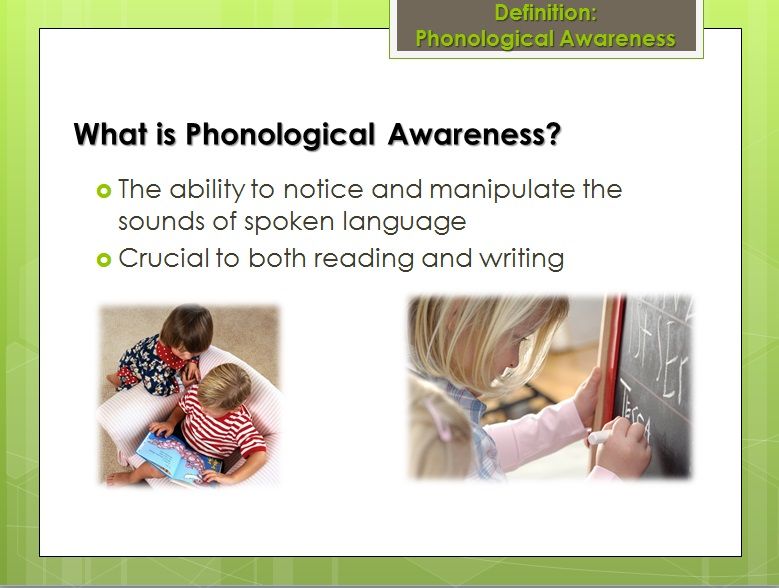
Well developed phonological precision helps in:
-
Understanding and following verbal instructions
-
Listening skills
-
Development of reading skills
-
Learning the rules of phonetics
6. Phonological fluency
Phonological fluency is the understanding that words are made up of different sounds, and the ability to quickly and accurately identify and manipulate these sounds.
Phonological fluency is critical to learning to read. This allows the student to memorize sequences of sounds and manipulate them quickly and accurately. This makes it easier to both write words and decode them. The more effectively the reader is able to decode, the more of his cognitive resources (mental abilities) he can focus on understanding the text.
A student with good phonological fluency will also find it easier to learn new words while reading.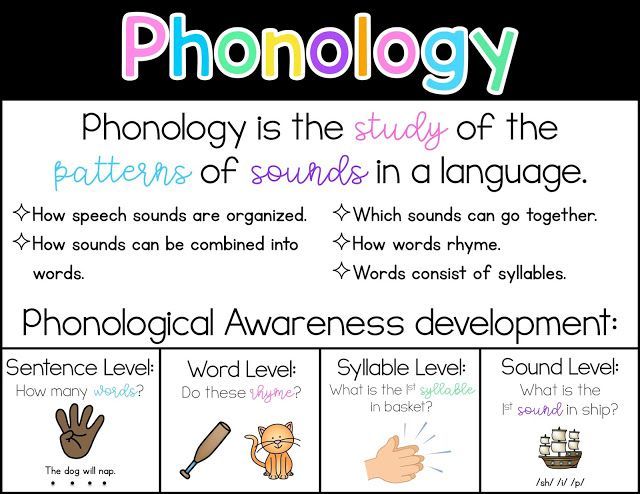 When confronted with a new word, a student who can accurately pronounce the word is more likely to recognize and understand its meaning.
When confronted with a new word, a student who can accurately pronounce the word is more likely to recognize and understand its meaning.
Well-developed phonological fluency helps in:
-
Learning the rules of phonetics
-
Development of reading skills
-
Development of writing skills
7. Phonological memory
Phonological memory is the ability to retain speech sounds in memory. This is necessary for spoken language and tasks such as comparing phonemes and making connections between phonemes and letters. It also helps with listening and reading to understand sentences, as it allows you to remember the sequence of words in order.
Phonological memory plays a key role in the development of oral and written language skills. This allows the student to:
-
Memorize and manipulate sound sequences
-
Associate spoken words with written ones
-
Memorize new words by determining their meanings
-
Remember the beginning of a sentence by listening to it to the end.

The ability to remember speech sounds is important for the correct understanding of sentences when changing the order of words in a sentence changes its meaning (for example, "The monkey bites the boy" and "The boy bites the monkey").
Accurate memory of word order also contributes to building accurate ideas about sentence structure and acquiring knowledge of syntax.
A student with a well-developed phonological memory develops phonemic perception and decoding skills more easily, knowledge of vocabulary and sentence structure is formed. Such a student follows instructions better and takes a more active part in class work with presentations, etc.
8. Auditory Processing / Auditory Perception
Auditory processing refers to what the brain does with the audio information it "hears". This includes various skills such as identifying and locating sounds, listening to background noise, and processing what is heard when the sound is fuzzy.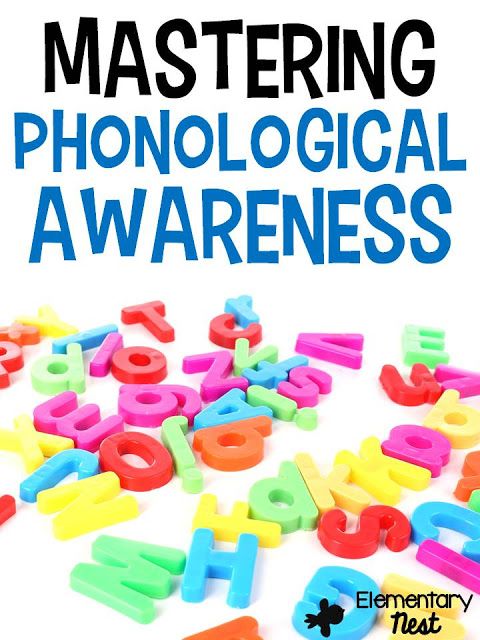
When a student manipulates the auditory information he has heard, but it doesn't sound right, this is called an auditory processing disorder (or auditory perception disorder).
This can happen if the child has difficulty understanding speech in background noise or has difficulty identifying where the sound is coming from. Or it could be a problem in distinguishing speech sounds that sound similar.
Find out 5 common hearing loss (HAI) myths!
9. Sequencing of audio information
Sequencing of audio information refers to the ability to identify and remember the order in which a series of sounds were presented. This is very important for matching sound sequences to letter sequences in decoding and writing.
Organizing audio information is critical to developing speaking and writing skills. The ability to identify and remember the order of sounds in words is important for recognizing subtle differences between words (such as "pot" and "top") and for developing phonemic perception and decoding skills.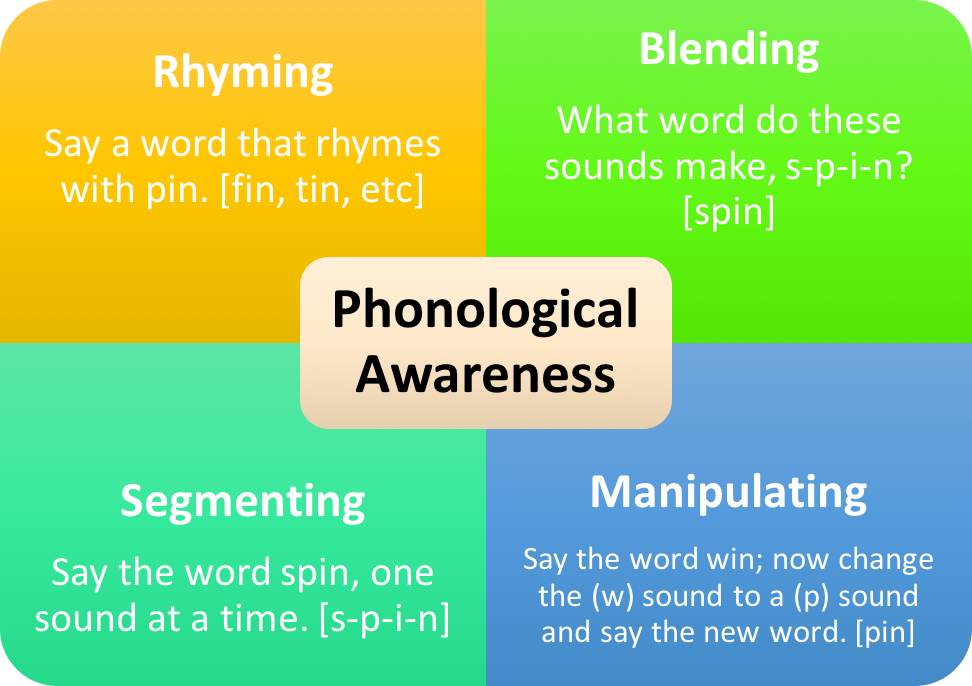
A student who has a well-developed ordering of sound information understands and absorbs information better, develops better oral and written speech skills and concentrates attention. Such a student becomes an expert reader and a successful student.
See also: How do weak cognitive skills affect learning?
10. Listening word comprehension
Listening word comprehension refers to the ability to accurately identify words heard based on auditory cues alone, without the aid of visual or contextual cues.
Listening comprehension of words is critical to the development of spoken language and vocabulary, and therefore essential to the development of reading and writing. This skill allows the student to accurately and efficiently identify words in speech and helps him form a correct understanding of the information presented by ear.
A student with well developed listening comprehension will find it easier to follow instructions and participate in class discussions; it is easier to answer questions, complete tasks and remember information; and it's much easier to become a proficient reader.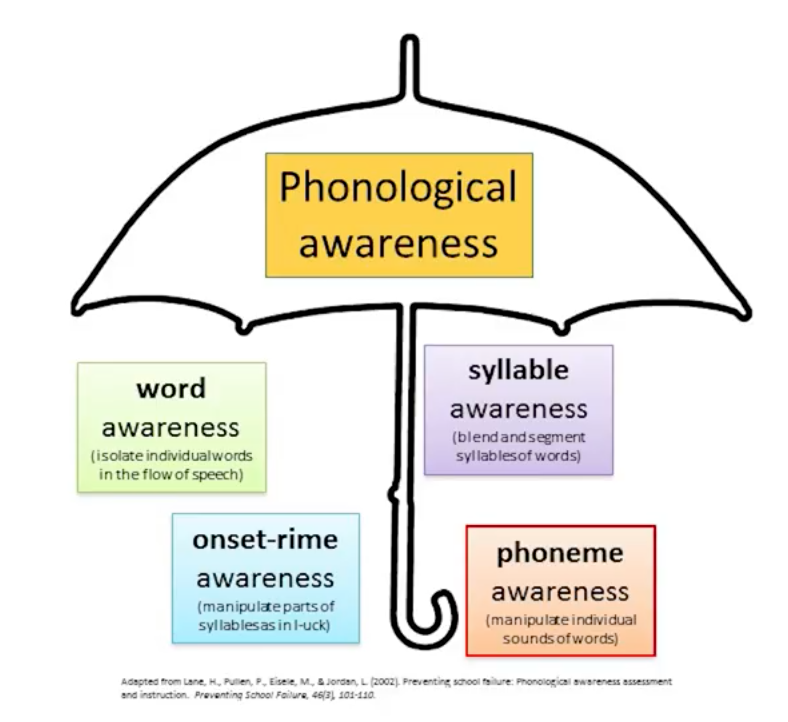
He will also find it easier to carry on a conversation in a noisy environment or when there are distractions.
11. Hearing accuracy
Hearing accuracy is the ability to accurately identify differences between sounds and correctly identify sound sequences.
Accuracy in listening is the foundation of speech and reading skills. This skill allows the student to quickly and accurately identify and distinguish between rapidly changing sounds, which is very important for distinguishing between phonemes (the smallest units of speech that distinguish one word from another).
A student with well-developed listening comprehension will find it much easier to follow instructions and participate in class work; it is easier to remember questions, tasks and information; and it's much easier to become a proficient reader. He will also be able to:
-
Read and write fast
-
Focus on verbally presented information
-
Maintain a conversation in a noisy environment or when there are distractions.
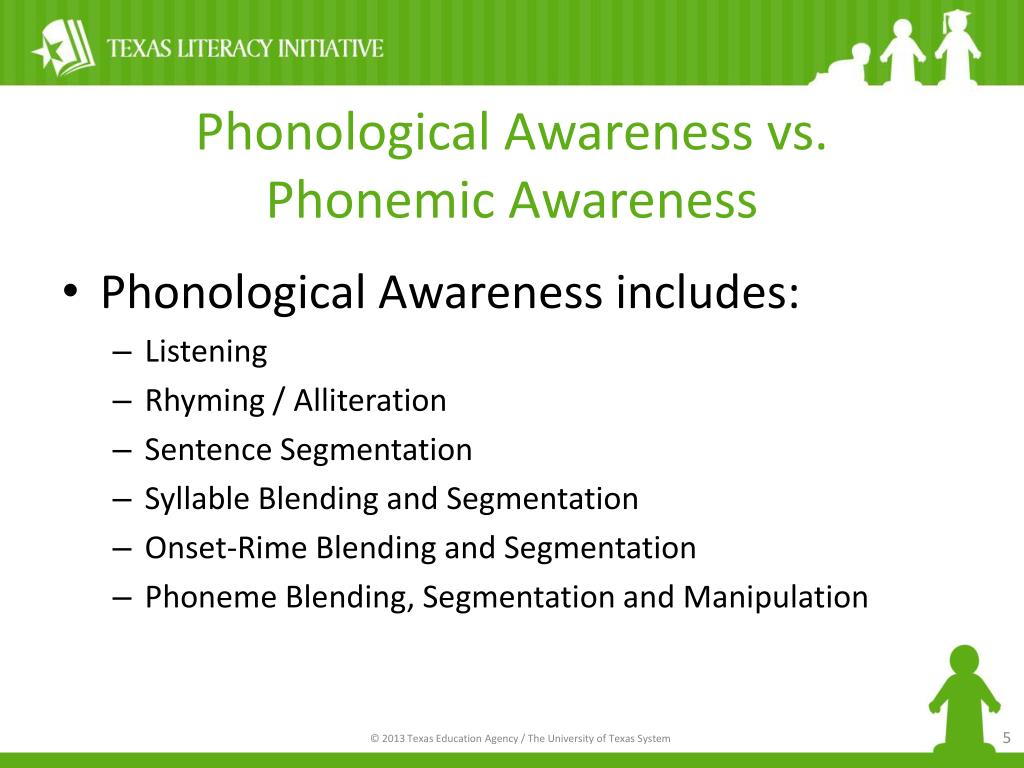
12. Listening comprehension
Listening comprehension is the ability to understand consecutive sentences and extract meaning from what is heard.
Listening comprehension is one of the foundations of oral and written speech. To develop more complex speech skills, a child needs to develop good listening comprehension. Well developed listening comprehension allows the student to recognize the meanings formed by combinations of words and series of sentences.
A student with good listening comprehension will find it much easier to respond to assignments and class discussions; it will be easier to answer questions and remember information; and it is easier to become a proficient reader and a successful learner. He will also be able to do well:
-
Focus on oral information
-
Making sense of history
-
Correctly follow verbal instructions
-
Correctly understand and answer questions
What is phonological awareness? - Tips for moms today
Phonological awareness includes the ability that we must acquire from the moment we learn to speak, with the help of know how to structure words in their little sounds and how they are composed.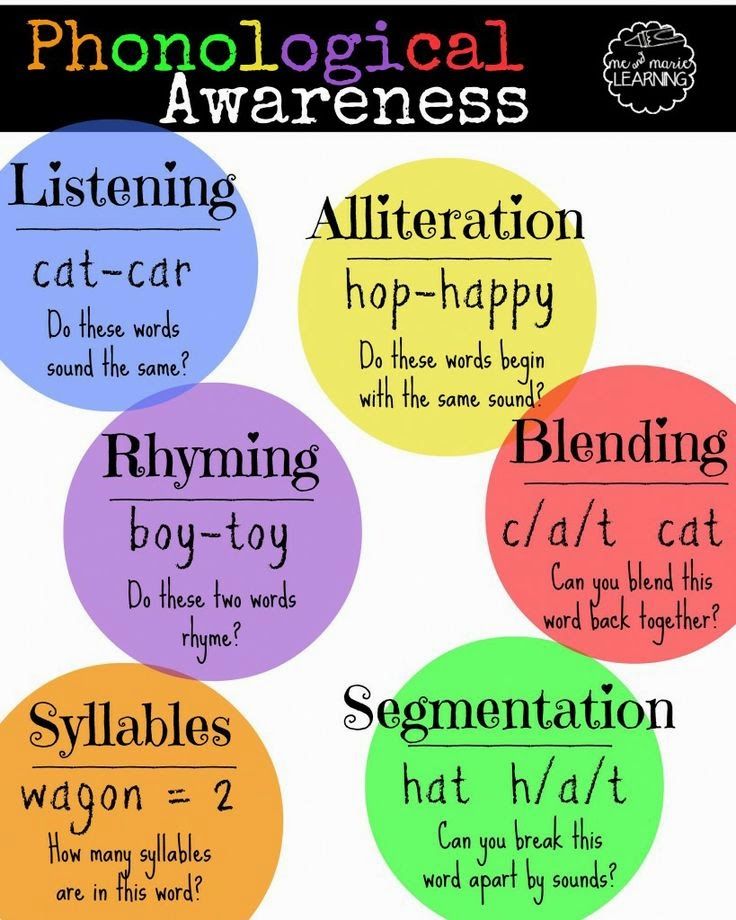 This ability is very helpful when it comes to literacy and we detail why.
This ability is very helpful when it comes to literacy and we detail why.
To learn to read, you must be able to master this skill. Phonological awareness is a very important technique that you must be able to control with a good balance of and this is a fact that usually resolves spontaneously at the stage of mental development.
Index
- 1 What is phonological awareness?
- 2 How do we learn from this technique?
- 3 Important points for this learning
- 4 Why is phonological awareness important?
What is phonological awareness?
This is an essential skill to master for good speaking and literacy development . You must be able to master this technique, understand words and know that they are made up of sounds or phonemes.
This ability to recognize the sounds in a word will open up the development of phonemic awareness, through this they will distinguish and recognize each sound in order to know how to form words.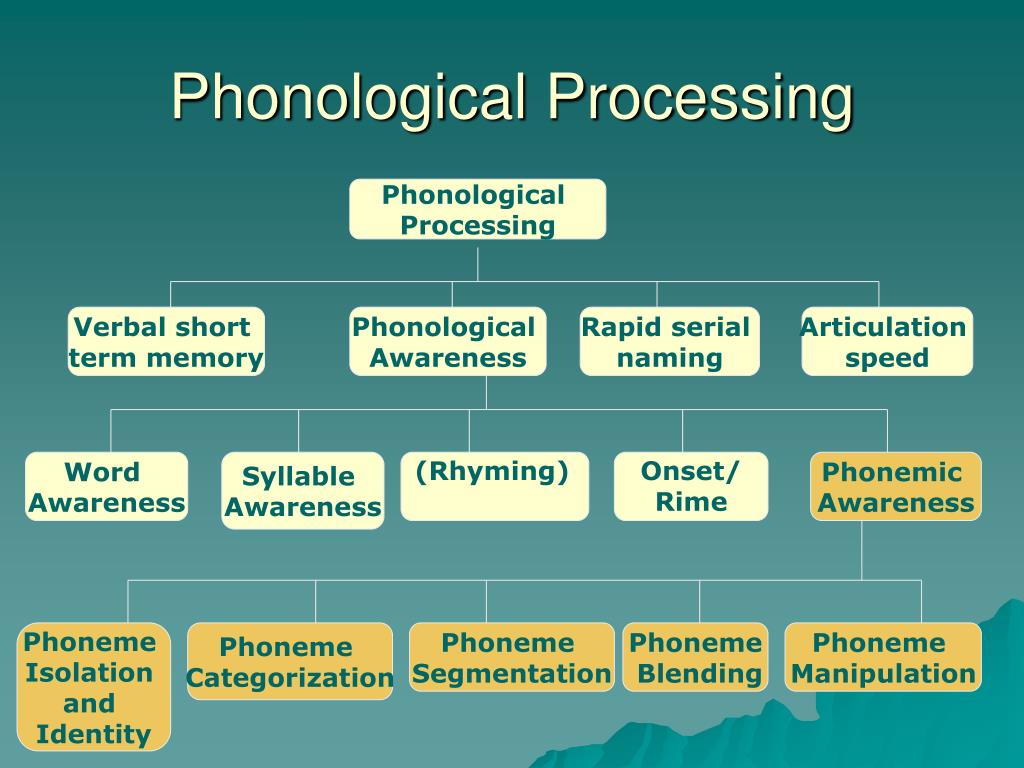 Long before children begin to read, they already know and are able to tune in to these sounds, , and this is where phonological awareness comes into play.
Long before children begin to read, they already know and are able to tune in to these sounds, , and this is where phonological awareness comes into play.
How do we learn from this technique?
Phonological awareness begins at one of the early stages of learning a child's speech , that is, between the stages of the cycle of infant education and primary education. Basically, children start learning words but don't know they are structured, rather they believe they are in a block. Consequently, they learn to break words into smaller parts, both by syllables and sounds.
This skill is for some It's not a big step, but for others it's . Consequently, the evolutionary form of this process must be carried out with the evolutionary form of each child and without coercion to it. In the process of phonetic discrimination, they begin with a certain sound. How can they be those who start with the word /p/ (paper, dad, stick, potato), they must be able to distinguish it from other words.
In this way we also find other words that are shorter or others that are longer, or that even almost resemble in their pronunciation /palo/ and /paso/, in other words, we can add another syllable to form a new word (see Summer). By following these simple guidelines, children They learn to structure sounds through the ability to distinguish words by syllables.
Important points for this training
- The most important thing is active listening . You have to make sure you pay attention to the sounds so that the nature of each one is interpreted in order to recognize them and then know how to control them.
- Learn phrases and words. This is one of the first steps when you know that not everything is in one block, that the language is made up of sentences, and that every sentence is made up of words.
- Syllables . This is another concept to be taught after they learn to recognize words.
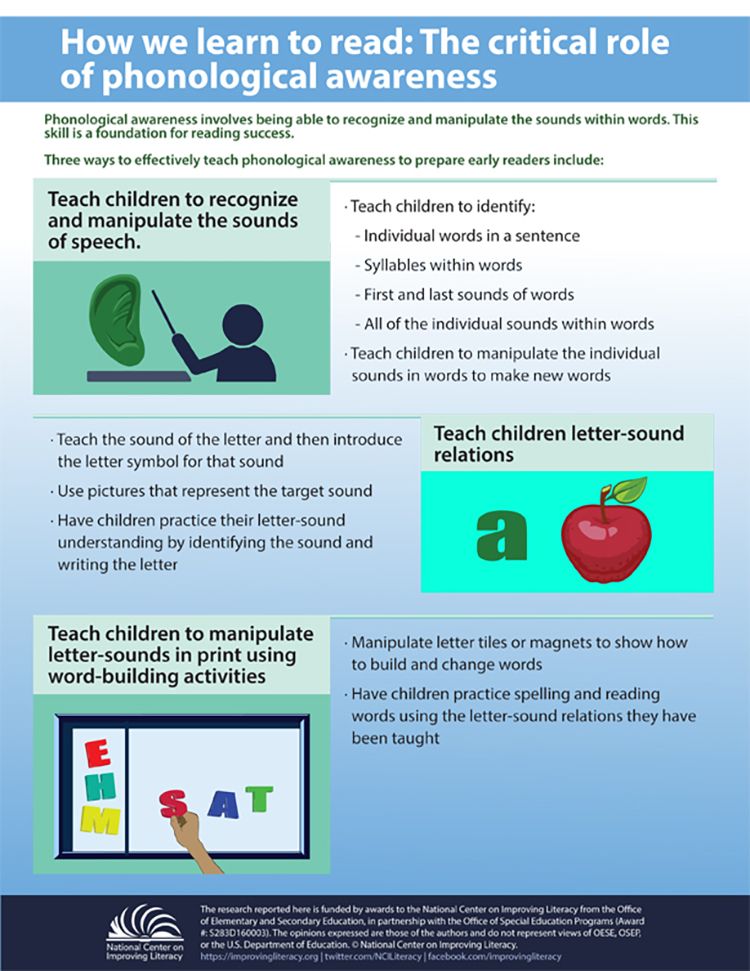
Learn more

